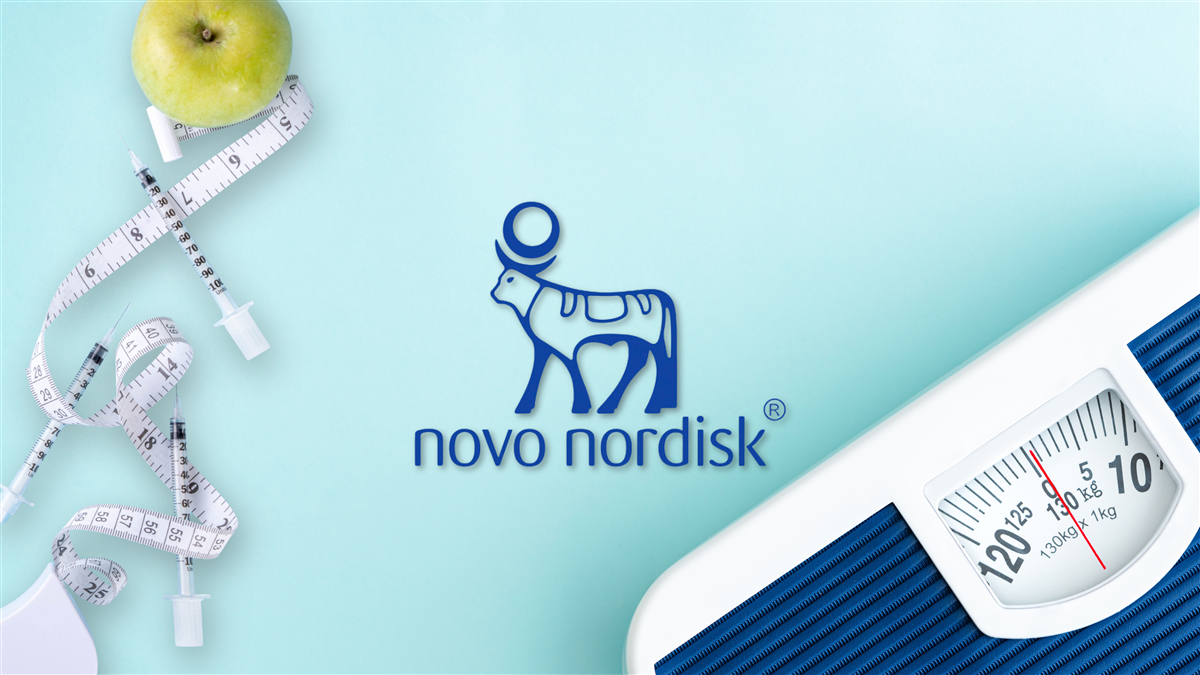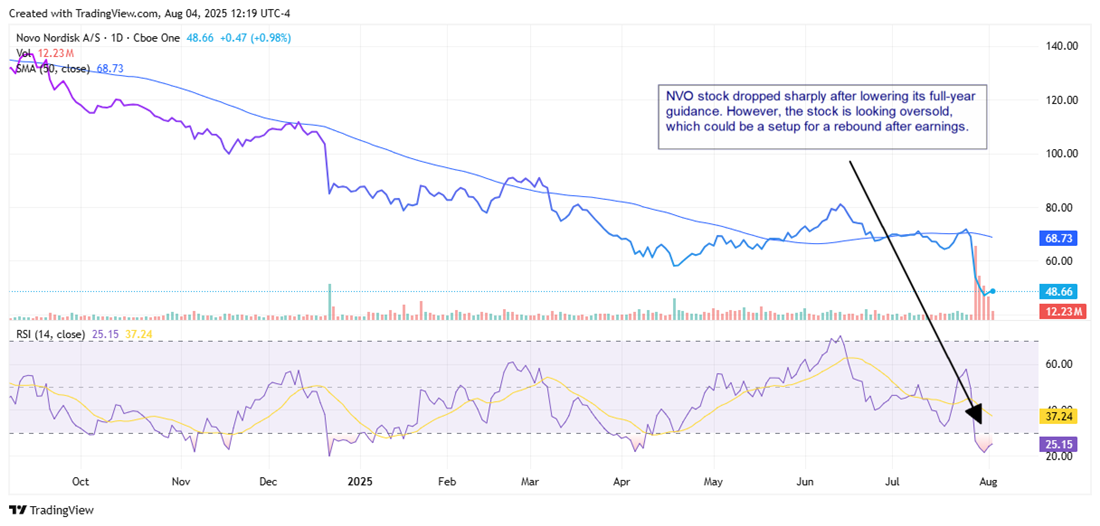|
|
|

|
|||||

|
|

Novo Nordisk A/V (NYSE: NVO) stock is testing the patience of buy-and-hold investors. Over the last five years, NVO stock is up more than 200%. However, in the last year, it’s down over 61% and more than 43% in 2025. Even in the volatile medical stocks sector, that kind of underperformance can’t be overlooked.
But what’s making shareholders anxious right now is the company’s recent slash of full-year guidance, which caused the stock to drop by 3% in less than a week.
Novo Nordisk cut its sales growth expectations to a range of 8% and 14%. The high end of that range is now consistent with the low end of the previous guidance of 13% to 21%. A similar story emerged with the company’s revised guidance for operating profit, which is now in a range of 10% to 16%, down from 16% to 24%.
However, less growth is still growth, and at a time when many stocks seem overvalued, NVO stock does not. Still, is it time for long-term investors to shed NVO stock?
Novo Nordisk recently announced the appointment of a new chief executive officer (CEO), Maziar Mike Doustdar, who officially takes the reins on August 6. One of the first problems Doustdar faces is the continuing threat from compounded GLP-1 drugs that are eating away at the company’s market share and growth. This is particularly evident in the surge in Hims & Hers Health Inc. (NYSE: HIMS) in 2025.
While compounded GLP-1s are undoubtedly an issue for the company's growth, they're not the only issue. Novo Nordisk also cited “lower-than-expected penetration” in international markets and the competition from Eli Lilly & Co. (NYSE: LLY), which continues to make gains in clinical efficacy and market share.
Compounded GLP-1 drugs aren’t a new problem. Novo Nordisk and Eli Lilly have been facing this issue almost since they launched their GLP-1 drugs.
The primary issue is cost. Most insurance companies will cover Ozempic (Novo Nordisk) and Mounjaro (Eli Lilly). These drugs are approved for the treatment of Type-1 diabetes (T1D), specifically glycemic control. Since diabetes is a chronic condition, insurers view these drugs as consistent with clear standards of care.
Insurance coverage is less consistent for Wegovy and Zepbound, which are the companies’ respective GLP-1 drugs for obesity. A more prominent danger is that Medicare does not cover these drugs.
Without insurance coverage, these drugs can be cost-prohibitive, which makes compounded GLP-1 drugs an alternative for patients looking for the benefits of these drugs. Frequently, compounded GLP-1 drugs can be obtained for 50%-70% less than the branded products.
However, another issue is why the compounded drugs are on the market to begin with. The overwhelming popularity of these drugs in a larger-than-expected addressable market was greater than Novo Nordisk or Eli Lilly could handle.
That allowed the Food & Drug Administration (FDA) to declare a shortage, permitting the legal compounding of GLP-1 drugs under certain conditions. However, this is not the same as FDA approval—a distinction Novo Nordisk emphasizes. Compounded versions carry risks, many of which remain hard to quantify.
Novo Nordisk has filed nine lawsuits to try to stop the growth of compounded alternatives, but so far, the company is not seeing any impact, even though the FDA told drug makers to stop producing their compounded products now that the shortage of products like Wegovy has ended.
Whatever side of the debate investors stand on, it won’t be long until they get more clarity. Novo Nordisk reports earnings on August 6 before the market opens. The earnings report should answer a simple question, with the stock down more than 29% in the last 30 days and over 3% in the last week.
Is the sell-off overdone?
If the company's results exceed expectations or are just in line with their forecast, investors might have a buying opportunity. NVO stock is now trading around 12x forward earnings and is trading at a discount to its historical averages.
That also puts it at a slight discount to the sector average.
During sell-offs like this, it’s easy to overlook fundamentals. However, Novo Nordisk is still a very profitable company, increasing revenue and earnings year-over-year (YOY).
Investors should also remember that the market for Ozempic and Wegovy is massive, which will allow room for many companies to compete.
However, in the near term, the company and investors will need to work through short-term obstacles. NVO stock is trading well below its 50-day simple moving average (SMA), which has already been an area of resistance for the stock. However, the selling volume appears to be tapering off, and with an RSI indicating oversold conditions, a bottom may be forming.

Before you make your next trade, you'll want to hear this.
MarketBeat keeps track of Wall Street's top-rated and best performing research analysts and the stocks they recommend to their clients on a daily basis.
Our team has identified the five stocks that top analysts are quietly whispering to their clients to buy now before the broader market catches on... and none of the big name stocks were on the list.
They believe these five stocks are the five best companies for investors to buy now...
The article "Novo Nordisk Stock Sinks—But Is a Bottom Finally In?" first appeared on MarketBeat.
| 1 min |
Novo Nordisk, Eli Lilly Stocks Drop on Wegovy Maker's Price-Cut Plan
NVO LLY
The Wall Street Journal
|
| 20 min | |
| 36 min | |
| 46 min |
Stocks to Watch Tuesday: Home Depot, Hims & Hers, Whirlpool
HIMS -6.93% NVO LLY
The Wall Street Journal
|
| 49 min |
Meta, AMD announce chip partnership, Novo Nordisk cuts US GLP-1 prices
HIMS -6.93% NVO
Yahoo Finance Video
|
| 1 hour | |
| 1 hour | |
| 1 hour | |
| 1 hour | |
| 1 hour | |
| 1 hour | |
| 1 hour | |
| 2 hours | |
| 2 hours | |
| 2 hours |
Join thousands of traders who make more informed decisions with our premium features. Real-time quotes, advanced visualizations, backtesting, and much more.
Learn more about FINVIZ*Elite